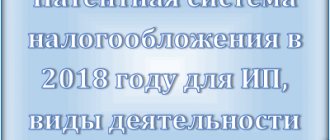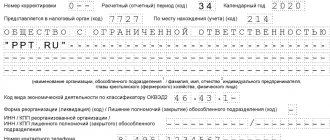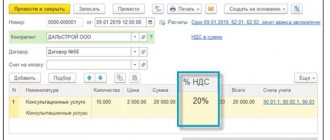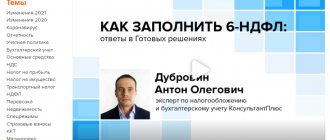Tax holidays have existed since 2015. At first it was assumed that they would be valid for only three years - until 2017. But then they were periodically extended for economic reasons.
This time, the reasons appeared again - the protracted pandemic and the associated crisis. According to the vice-president of the Russian Union of Industrialists and Entrepreneurs (RSPP), David Yakobashvili, Russian business has stopped looking into the future with optimism, and “panic sentiment” has appeared among market participants.
From time to time, officials talk about the need to reduce the tax burden and measures to support small businesses. One of these measures was tax holidays.
Tax holidays - 2020-2021
Tax holidays for individual entrepreneurs are an opportunity not to pay tax under a simplified tax regime or a patent for two years after state registration as an individual entrepreneur, subject to certain conditions (clause 4 of article 346.20, clause 3 of article 346.50 of the Tax Code of the Russian Federation).
This bonus:
- allows individual entrepreneurs to reduce the tax burden;
- makes it possible to use saved funds for business development.
Individual entrepreneurs acquired the right to pay tax under the simplified tax system and special tax system at a rate of 0% back in 2015. Are there tax holidays for starting individual entrepreneurs at present? Yes, I have. Initially, the validity period of this event was set until 12/31/2020, but it has now been extended until 01/01/2024. Thus, individual entrepreneurs will have the opportunity to take advantage of this tax preference for a long time if they:
- work in a region where a regulatory act on tax holidays has been adopted;
- use simplified taxation system or PSN;
- carry out business activities in the field of personal services, production, scientific and (or) social spheres, provide personal services or provide places for temporary residence;
- the share of income from preferential activities is at least 70%.
Regional authorities may establish additional restrictions on the use of preferential holidays for individual entrepreneurs—for more details, see below.
How to use it correctly
At the registration stage, within a month after being registered, a person must submit to the Federal Tax Service an application about his desire to work under a simplified system. And when submitting a declaration for the year, he will need to indicate a tax duty of 0%. If during this period reports were submitted according to the standard procedure, you will no longer be able to return payments. An application is submitted similarly when registering an individual entrepreneur for a patent.
Are there regional restrictions for starting entrepreneurs?
When introducing tax holidays on their territory, regional authorities have the right to establish restrictions:
- by types of activities covered by vacation;
- by number of employees and/or income received;
- by the duration of the tax holiday (this can be one tax period or two);
- according to the period of validity of the regional law on tax holidays ─ it can be valid until the end of the officially established period (until December 31, 2023), and in some regions the law has already expired.
Regions that do not consider it necessary to introduce this regime on their territory have the right not to adopt a law on tax holidays for individual entrepreneurs. In such a situation, entrepreneurs are deprived of the opportunity to apply a 0% rate, even if all other criteria are met.
We described in this publication how to find a list of regions with current laws on tax holidays for individual entrepreneurs.
Example 1
IP Samolov I.G. works in the territory where the law on tax holidays is in force. The date of registration with the tax authorities is 01/16/2020, and the date of entry into force of the law is 01/25/2020. An entrepreneur cannot count on tax holidays, since he registered as an individual entrepreneur before the law came into force.
Example 2
Individual entrepreneur I. E. Kasimov registered with the tax office on 02/01/2020 with the expectation that by the end of 2021 he would be able to save on the cost of the patent by taking advantage of tax holidays. The tax authorities gave him a notice to pay the patent at the regular (non-zero) rate. The fact is that the regional law was in force only from 2017 to 2021. And from 2021 in this region, the zero rate for individual entrepreneurs does not apply.
Which entrepreneurs are considered to be registered for the first time?
In practice, there are cases when an entrepreneur ceases activities, is deregistered, and then re-registered as an individual entrepreneur after the regional law introducing tax holidays comes into force. Can he take advantage of zero rates?
Yes maybe. The Supreme Court, in a review of judicial practice dated 07/04/18, indicated that tax holidays also apply to those individuals who have ceased business activities and decided to resume them after the relevant regional law came into effect (see “What is allowed to “simplified”: five conclusions of the Supreme Court for the benefit of taxpayers").
The Ministry of Finance also refers to the opinion of the judges in its explanatory letters (see “In what cases are re-registered individual entrepreneurs subject to tax holidays”).
Register as an individual entrepreneur and keep accounts for a year and submit all reports for free
How to apply for tax exemption and how to report?
How to apply for tax holidays for individual entrepreneurs? Do I need to notify the tax authority that an individual entrepreneur is subject to tax holidays? The law does not require this. But it is better for the entrepreneur to check with his inspection whether any additional papers are needed from him in this regard.
Practice shows that sometimes additional clarification is indispensable - inspectors may not see any reason to apply a zero rate to individual entrepreneurs. This may be due to technical difficulties in correctly qualifying individual activities.
Tax authorities may deny an individual entrepreneur a zero rate if the wording in the regional law and the name of its type of activity look different. Then the individual entrepreneur can give the necessary explanations in writing, which will help convince controllers and obtain the right to a zero rate.
Attention! Hint from ConsultantPlus It is possible that you paid the cost of a patent or tax under the simplified tax system, and then found out about tax holidays. If they apply to you, then... (for more details, see K+).
Holidays for individual entrepreneurs exempt them from taxes, but do not require reporting - individual entrepreneurs using the simplified tax system as usual submit a declaration at the end of the year indicating a zero tax rate. Entrepreneurs with a patent do not need to report to the tax office.
The individual entrepreneur is not required to submit any additional reports related to the application of the zero rate during the holidays.
What should those who did not know about the holidays and have already paid tax do?
There are no direct comments from legislators on such situations. If you are sure that you are subject to the holiday, but have already paid the simplified tax, you can submit an updated declaration with a zero rate and return the tax. Attach explanations and documents confirming that you were entitled to the benefit. Be prepared that tax officials will carefully check the information, because we are talking about tax reduction.
A patent is more difficult because you have already applied for and purchased the patent. We recommend that you contact your tax office with this question.
Is it possible to save on insurance premiums?
Paying insurance premiums for individual entrepreneurs is a serious financial burden. Unfortunately, tax holidays do not apply to insurance premiums. This means that from the very beginning of his activities, the entrepreneur is fully obliged to fulfill all the obligations of the insurer to extra-budgetary funds - this equally applies to contributions from the salaries of individual entrepreneurs’ employees, and to the entrepreneur’s contributions for himself.
Officials, when asked about the exemption of individual entrepreneurs from paying contributions during tax holidays, note the following (letter of the Ministry of Finance of Russia dated October 18, 2017 No. 03-11-11/68194):
- The status of an individual entrepreneur is not only the opportunity to exercise certain rights and guarantees, but also the assumption of risks and responsibilities: according to the rules of doing business, fulfilling tax and non-tax obligations, including the payment of insurance premiums.
- At the expense of insurance contributions received by extra-budgetary funds, insurance guarantees are provided for the insured persons: for the payment of pensions, temporary disability benefits, social benefits in connection with maternity, etc.
Officials proceed from the fact that the state does not force a citizen to engage in one or another type of business activity. Before receiving the status of an individual entrepreneur, he himself assesses his readiness for this process in terms of education, skills, finances and property, including the ability to bear the burdens inherent in an individual entrepreneur.
How holidays are used in practice
Let's look at the use of tax holidays using practical examples.
Example No. 1. Citizen Orlova A.A. lives in St. Petersburg and conducts excursions for tourists. Previously, she worked under civil contracts (CLA) for a travel company. A separate contract was concluded for each excursion, and the company’s accounting department transferred 13% of the personal income tax from the tour guide’s earnings to the tax office. In 2021, Orlova earned 840 thousand rubles. Of this, the travel agency transferred 109.2 thousand rubles to personal income tax from Orlova’s earnings. The guide's net earnings amounted to 730.8 thousand rubles.
840,000 rubles × 13% = 109,200 rubles
840,000 rubles - 109,200 rubles = 730,800 rubles
Let's imagine that Orlova A.A. in January 2021, I registered an individual entrepreneur and chose PSN. As a “newbie” she would be entitled to a tax holiday. The state fee for registering an individual entrepreneur is 800 rubles. If Orlova plans to cooperate with organizations and receive money into a bank account, bank expenses for the year will average 15,000 rubles. Let's calculate fixed payments to the Pension Fund:
With an income of 300,000 rubles, contributions will be 26,545 rubles.
Let's calculate contributions to the Pension Fund in the amount of 1% of the amount of income exceeding 300,000 rubles:
(840,000 rubles - 300,000 rubles) × 1% = 5,400 rubles.
Total amount of contributions paid:
26,545 rubles + 5,400 rubles + 5,840 rubles = 37,785 rubles.
Net income of individual entrepreneur Orlova A.A. for 2021 will be:
840,000 rubles - 800 rubles - 37,785 rubles - 15,000 rubles = 786,415 rubles
The difference in income compared to working under a civil contract: 786,415 rubles - 730,800 rubles = 55,615 rubles.
The difference between earnings according to the GAP and entrepreneurship is 55,615 rubles. This is almost equal to Orlova’s average monthly income. This means that, using the patent and tax holidays, she earned the 13th bonus.
Example No. 2. Smirnov registered as an individual entrepreneur and received a patent for furniture repair. Not knowing how things would go, he initially purchased a patent for 6 months. In his case, 6 months is the first tax period.
For the second time, Smirnov has already acquired a patent for the maximum possible period of 12 months. The total duration of Smirnov's tax holiday was 18 months.
Let's calculate the monthly income tax of an entrepreneur with the selected PSN system. The basic profitability for his type of activity is set at 300,000 rubles per year. The tax rate for PSN is 6%.
Let's calculate the cost of a patent: 300,000 rubles × 6% = 18,000 rubles per year or 18,000 rubles / 12 months = 1,500 rubles per month.
During the tax holiday, which lasted 18 months, Smirnov saved: 1,500 rubles × 18 months = 27,000 rubles. If already in the first tax period an individual entrepreneur had purchased a patent for 12 months, he would have been able to enjoy the benefit for 24 months and would have saved another 9,000 rubles.
How to calculate the share and what to do if it is insufficient?
Entrepreneurs often find it difficult to calculate the share of a preferential activity. But the possibility of applying a zero rate depends on the correctness of the calculations. How to correctly calculate this indicator if an individual entrepreneur has several types of activities, including both preferential and non-preferential ones? Let's explain with examples.
Example 3
IP Safiullin D.K. registered in a region where tax holidays apply. He applies the simplified tax system “income minus expenses” and is engaged in three types of activities, only one of which is included in the list of preferential ones.
Based on the results of the expired tax period, individual entrepreneur D.K. Safiullin received income in the total amount of 9,589,968 rubles, including:
- activity 1 (preferential) - RUB 7,544,997;
- activity 2 - 1,078,540 rubles;
- activity 3 — 966,431 rub.
Calculation of the share from preferential activities:
7,544,997 / 9,589,968 = 0.787 or 78.7%
The calculated figure exceeds the legally established limit of 70%, which means that individual entrepreneur D.K. Safiullin is not obliged to pay the simplified tax system for this period.
Example 4
The income of individual entrepreneur D.K. Safiullina for the past year amounted to 9,589,968 rubles, including:
- activity 1 (preferential) - 6,357,100 rubles;
- activity 2 - RUB 2,386,219;
- activity 3 — 846,649 rub.
Calculation of the share from preferential activities:
6,357,100 / 9,589,968 = 0.663 or 66.3%
The lower limit allowed by law has not been reached: 66.3% <70%, which means that IP Safiullina D.K. does not have the right to a zero tax rate. According to paragraph 4 of Art. 346.20 of the Tax Code of the Russian Federation, he is obliged to pay the simplified tax system at a rate of 15% on the basis of “income minus expenses”.
Share of preferential type of activity in the income structure
If an entrepreneur is simultaneously engaged in several types of activities, then he may have difficulty calculating the share of revenue from a preferential type in the total amount of income.
Example. IP Sidorov uses the simplified tax system and during the calendar year received the following amounts of revenue from each type of activity:
- first direction 200,000 rubles
- second direction 700,000 rubles
- third direction 150,000 rubles
The total for the year was 1,050,000 rubles. The second area of activity is recognized as preferential in accordance with regional legislation; it is necessary to check its share in the total volume. It is necessary to divide the revenue of a particular type of activity by the total amount of income and multiply by 100%.
(700 000 / 1 050 000) * 100%
In the example under consideration, the share was 66.67%, therefore, the entrepreneur cannot qualify for a tax holiday.
Should an individual entrepreneur keep records of income and expenses during the holidays using the simplified tax system?
Clause 1.2 of the Procedure for filling out the book of income and expenses, approved by Order of the Ministry of Finance of Russia dated October 22, 2012 No. 135n, states that taxpayers are required to ensure the completeness, continuity and reliability of recording the indicators of their activities necessary for calculating the tax base. Under these circumstances, there is no need to calculate the tax base for the tax - when multiplied by a rate of 0 percent, you will still get a zero value.
Why keep records then? Do tax holidays for individual entrepreneurs using the simplified tax system give them the right not to draw up a book of income and expenses (KUDiR)?
There is no direct answer to this question in tax legislation. However, a simplifier should not refuse to keep records for the following reasons:
- the procedure for filling out the KUDiR does not provide for the possibility for individual entrepreneurs to be exempt from keeping records of income and expenses for the purpose of calculating the tax base, to which a 0% rate is applied;
- For the absence of a completed book, individual entrepreneurs can be fined 10,000 rubles. (clause 2 of article 120 of the Tax Code of the Russian Federation).
In addition, information from KUDiR is necessary for the entrepreneur himself. If the income limit established in the regional law is exceeded or the share of income from preferential activities is less than 70%, the individual entrepreneur loses the ability to calculate tax at a rate of 0% and must determine tax liabilities in the usual manner.
Legal framework, innovations
The possibility of using tax breaks is stipulated by Federal Law No. 477 of December 29, 2014. According to this regulatory act, you can take advantage of tax holidays one-time for a certain period of time. However, this opportunity is not available in all regions of Russia. Regional authorities of the subjects in which benefits are allowed have the right to adjust the conditions for implementing the regulatory legal act at their discretion. The adjustment directly depends on the economic situation in a particular region.
Results
Tax holidays for individual entrepreneurs are valid in 2021, and will continue to be valid in 2021-2023.
They allow entrepreneurs on a simplified basis or a patent to apply a zero rate for the simplified tax system or PSN if a number of conditions are met: registration as an individual entrepreneur occurred for the first time after the regional authorities adopted the law on tax holidays, the share of income from preferential activities is at least 70%, and the types of activities themselves are listed in the regional law. The same law may establish additional restrictions on the average number and maximum allowable income. You can find more complete information on the topic in ConsultantPlus. Free trial access to the system for 2 days.
Detailed list of subjects of the Russian Federation
The decision on the possibility of providing preferences and the conditions under which they can be issued are determined by local authorities. The situation is different in different parts of the country. In some places you can get as many as three full vacation periods, in other places - only one. There are restrictions on the use of the zero rate, in the form of the number of employees of the enterprise, the amount of annual income, during the holidays. While the deadline for receiving benefits is extended until the beginning of 2021, only a few regions have officially extended the final period until 2023.
| The subject of the Russian Federation | The date from which a tax holiday was established in a constituent entity of the Russian Federation for individual entrepreneurs using |
| USN, PSN | |
| Adygea | until December 31, 2023 |
| Altai | until December 31, 2023 |
| Bashkortostan | extended until January 1, 2024 |
| Buryatia | until 12/31/2020 |
| Dagestan | until 12/31/2020 |
| Ingushetia | until 12/31/2020 |
| Kabardino-Balkarian Republic | until December 31, 2020, but |
| Republic of Kalmykia | until January 1, 2022 |
| Karachay-Cherkess Republic | until 12/31/2020 |
| Karelia | until 12/31/2020 |
| Komi | until January 1, 2024 |
| Crimea | until 12/31/2020 |
| Mari El | until 12/31/2020 |
| Mordovia | valid until 12/31/2017 |
| Sakha (Yakutia) | until 12/31/2020 |
| Tyva | until December 31, 2020, but extend |
| Udmurt republic | extend until December 31, 2023 |
| Khakassia | until January 1, 2024 |
| Chechen Republic | until 12/31/2020 |
| Chuvashia | valid until December 31, 2017, until 2024 |
| Altai region | Until 12/31/2020 |
| Transbaikal region | until 12/31/2020 |
| Kamchatka Krai | 31.12.2020 |
| Krasnodar region | valid until 2021, no information about extension yet |
| Krasnoyarsk region | until 12/31/2020 |
| Perm region | until December 31, 2020, but extend |
| Primorsky Krai | until 12/31/2020, no information about extension yet |
| Stavropol region | until January 1, 2024 |
| Khabarovsk region | until 12/31/2020 |
| Amur region | |
| Arhangelsk region | extended until December 31, 2023 |
| Astrakhan region | information about the extension on the website of the Ministry of Economic Development of the Astrakhan Region |
| Belgorod region | until 12/31/2020 |
| Bryansk region | extended until January 1, 2024 |
| Vladimir region | until January 1, 2024 |
| Volgograd region | until December 31, 2023 |
| Vologda Region | until 12/31/2020 |
| Voronezh region | until 12/31/2020 |
| Ivanovo region | until January 1, 2024 |
| Irkutsk region | until 12/31/2020 |
| Kaliningrad region | valid until 12/31/18 |
| Kaluga region | until 12/31/2020 |
| Kemerovo region - Kuzbass | until 12/31/2020 |
| Kirov region | until 12/31/2020 |
| Kostroma region | until January 1, 2024 |
| Kurgan region | until 12/31/2020 |
| Kursk region | extend until January 1, 2024 |
| Leningrad region | until 12/31/2020 |
| Lipetsk region | until January 1, 2024 |
| Magadan Region | until 12/31/2020, no information about extension yet |
| Moscow region | until 12/31/2020 |
| Murmansk region | until 12/31/2020 |
| Nizhny Novgorod Region | until 12/31/2020 |
| Novgorod region | until 12/31/2020 |
| Omsk region | until 12/31/2020 |
| Orenburg region | until 12/31/2020 |
| Oryol Region | until 12/31/2020 |
| Penza region | until 12/31/2020 |
| Pskov region | until December 31, 2023 |
| Rostov region | until 12/31/2020, but extended until January 1, 2024 |
| Ryazan Oblast | until January 1, 2024 |
| Samara Region | extended until December 31, 2023 |
| Saratov region | until December 31, 2020, but extend |
| Sakhalin region | until December 31, 2023 |
| Sverdlovsk region | until 12/31/2020 |
| Smolensk region | extended until December 31, 2023 |
| Tambov Region | until January 1, 2024 |
| Tver region | until 12/31/2020 |
| Tomsk region | until January 1, 2024 |
| Tula region | until January 1, 2024 |
| Tyumen region | until 12/31/2020, but |
| Ulyanovsk region | until 12/31/2020 |
| Chelyabinsk region | until 12/31/2020 |
| Yaroslavl region | until December 31, 2023 |
| Moscow | until 12/31/2020 |
| Saint Petersburg | extend until December 31, 2023 |
| Sevastopol | until January 1, 2024 |
| Jewish Autonomous Region | until 12/31/2020 |
| Nenets Autonomous Okrug | until 12/31/2020 |
| Khanty-Mansiysk Autonomous Okrug - Ugra | until 12/31/2020 |
| Yamalo-Nenets Autonomous Okrug | until 12/31/2023 |
Other important changes
Perhaps the best news in our review for individual entrepreneurs without employees is the opportunity to work without a cash register until July 1, 2021. The deferment from CCP began to operate in mid-2019 and applies to entrepreneurs who provide services, perform work or sell products of their production.
And some more news on interaction with the Federal Tax Service:
- From September 1, 2021, the tax service will be able to forcibly deregister individual entrepreneurs. But this will become possible if two conditions are simultaneously met: the presence of arrears in taxes (duties) and the absence of reporting for 15 months.
- The first tax period for the simplified tax system was changed again. We are talking about those entrepreneurs who registered in December of this year. From 2021, they have the right to report for the first time not for an incomplete year (i.e. only for December), but to submit one declaration for December and the next year. But this norm was canceled and the previous rules were returned. That is, if an individual entrepreneur registered in December 2021, he must submit a declaration no later than April 30, 2020.
- For minor arrears - up to 3,000 rubles - the Federal Tax Service will no longer block the current account of an individual entrepreneur. The decision on forced collection will be made only three years after the debt has not been repaid.
- The Federal Tax Service intends to seriously address gray wages. The wages of each employee will be analyzed, comparing it with the regional minimum wage and the average wage in the industry. And if it is confirmed that the salary was issued in an envelope, the employer will pay personal income tax on the amount in excess of the official payment at his own expense.









